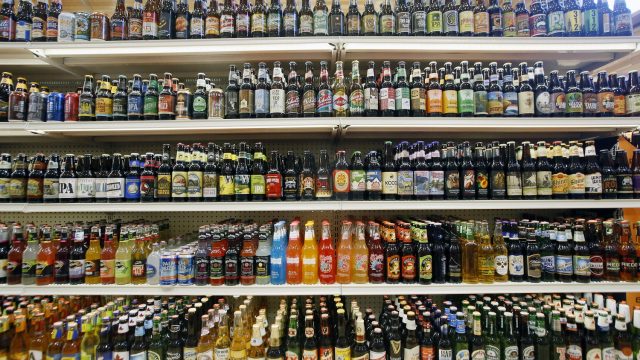Enough With These "Drunkest Cities In America" Articles

Happy Harry’s Bottle Shop Carrie Snyder / The Forum
In the world of online media the listicle is a powerful tool.
That’s where you create some list like the world’s most dangerous places or, in the case of this Fargo Forum article based on a list made by 24/7 Wall Street, America’s drunkest cities and then watch it get lots and lots of clicks.
Because people love lists. Particularly people with some affiliation to the places or things put at the top or bottom of lists. Journalists also like these lists, because they’re low hanging fruit (yes, I’ve fallen for them in the past too).
Heck even politicians love them. Governor Jack Dalrymple has touted another listicle made by 24/7 Wall Street which claimed North Dakota was the best-run state in the nation.
But there’s a problem. They’re very often bunk. Ranking states based on a few scant criteria may be a great way to produce seemingly informative articles which spark a great deal of conversation, but they rarely delve deep enough into the realities of the topics they address to tell us anything meaningful.
For instance, the “drunkest cities” thing. The folks at 24/7 Wall Street determined which cities are the drunkest, and which aren’t, based on “self-reported binge and heavy drinking rates based on a report from the Robert Wood Johnson Foundation and the University of Wisconsin Population Health Institute.
[mks_pullquote align=”right” width=”300″ size=”24″ bg_color=”#ffffff” txt_color=”#000000″] Ranking states based on a few scant criteria may be a great way to produce seemingly informative articles which spark a great deal of conversation, but they rarely delve deep enough into the realities of the topics they address to tell us anything meaningful.[/mks_pullquote]
Which sounds really great, except that alcohol as a public policy issue is far more complicated than self-reported binge drinking. What if people of one part of the country are more honest than people in other parts of the country? What if the people of one area drink more alcohol, but do so more responsibly? And is the definition of binge drinking a reasonable approximation of what might reasonably be considered problem drinking? The CDC defines an alcohol binge as “a pattern of drinking that brings a person’s blood alcohol concentration (BAC) to 0.08 grams percent or above.”
It’s a little ridiculous to think that people could accurately self-report whether or not they’ve crossed such an exacting threshold. Also, that’s a very low threshold. So low that I suspect most social drinkers – people who none of us would reasonably consider to be problem drinkers – are guilty of binging using the government definition.
Headlines like the one in the Forum about Fargo being one of the “drunkest” cities in America are used in public policy debates demanding more spending on cops, as well as stricter laws.
Which, in turn, leads to more DUI arrests which are themselves used as evidence for more law enforcement spending and tougher laws.
See where this cycle is heading?
What we should be worried about is not DUI arrests, or online listicles, but rather real problems. Alcohol-related accidents, injuries, deaths, and property damage. Not to mention alcohol-related crimes like domestic violence. These are the measure of the problems alcohol presents our communities.
In politics, perception is reality. Listicles present a what is often a false impression, based on exaggerations from a very shallow analysis of the data, which then have a disproportionate impact on public policy debates.
It’s a real shame.




